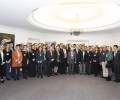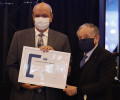Interview with François Casterlein at the 2015 FIA AGA

Q: The Vision 2030 report has been welcomed by many clubs. Do you feel that this is because it gives a practical angle to the mobility challenges ahead?
A: I think people realise that you’re not gonna make it on your own. You have larger clubs who are probably aware of the situation and have already engaged in a lot of activities to defend themselves but they are also going to face a ceiling that is too big, they won’t even get there. And then you have smaller clubs, for whom there are a lot of things to take from this study because many clubs have already engaged in initiatives and thought about it, so they can re-use this and apply it to their own markets. But for larger clubs I think even they are realising that you need to join forces to go a step further because you want to be able to compete. You don’t just want to be as good as the competition you want to be better. Therefore, collaboration will be increasingly necessary, not only to generate economies of scale but just to be able to face global completion.
Q: What’s the time frame for that response? When do clubs need to start?
A: Tomorrow, or actually yesterday because clubs need to position themselves on the big changes we already see. However, we saw some smaller clubs engaging in a lot of activity and initiatives but actually that’s not good either because you’re putting all your effort into things which might not materialise. That’s why we say that they need to be intelligent and watch the market before investing resources and deploying initiatives. We see three levels of development: strategic corner stones, strategic angles and then the elements for which you need to wait and observe the market before moving on.
Q: The report provides a number of solutions - almost like a toolbox of responses. Is that how you see it?
A: I think this is to show that this is not purely a theoretical study which is talking about trends. We wanted to demonstrate to the clubs that it’s not only about the high level stuff. We have very detailed elements that clubs can sometimes very easily apply.
Q: So do you feel there difficult times ahead?
A: Well, these are challenging times but it is also a time full of opportunities. It’s a changing environment. You can choose to see change as a difficulty but there are also new markets, new services, and you can occupy that space.

 Facebook
Facebook Twitter
Twitter






